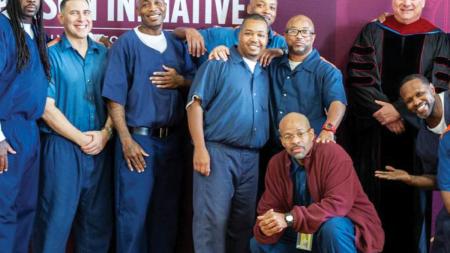From Human Rights to Gossip: Conference Covers Gamut of Practicing What You Preach

Statue of Dominican friar Antonio de Montesinos at United Nations
Caballero1967 - Own work, CC BY-SA 4.0, https://commons.wikimedia.org/w/index.php?curid=46956533
Just a half-dozen years before Martin Luther sparked the Reformation by nailing 95 theses to the door of the Castle Church in Wittenberg, Germany, a Dominican friar preached against slavery and advocated for human rights to Spanish authorities on the island of Hispaniola.
In a similar way to Luther’s action, the 1511 sermon by the Dominican friar, Antonio de Montesinos, had a stirring and lasting effect, said Fr. Gregory Heille, professor of homiletics at Aquinas Institute of Theology in St. Louis, Mo.
“This discourse about human rights led to the birth of international law,” said Heille, one of two keynote speakers at Calvin Theological Seminary’s fall preaching conference on Thurs., Oct. 26.
“A statue of Montesinos preaching his human rights sermon stands today in the members’ courtyard of the United Nations building in New York City -- a tribute to 500 years of international law in defense of human rights,” said Heille.
Sponsored by the Center for Excellence in Preaching at the seminary, the conference was titled “North American Preaching Since Vatican II” and was tied to the Oct. 31 commemoration of the 500th anniversary of the Reformation.
Also speaking was Rev. Tim Brown, who taught homiletics for several years at Western Theological Seminary, Holland, Mich., before being named president of the seminary. His topic focused on Protestant preaching in the past half-century since the Second Vatican Council.
Heille used his presentation to discuss how issues of human rights were addressed 500 years ago by the Roman Catholic Church and how those issues became an important aspect of the Vatican Council, which met in the 1960s and led to significant reformation within the Catholic Church and its emphasis on the rights and treatment of the poor.
“This 500-year-old Caribbean tradition of evangelization and accompaniment of the poor is itself another story that has proved foundational to a Catholic Vatican II vision that remembered the poor” and called Catholics “to make a preferential option for the poor.”
Heille also spoke about the preaching approach of Pope Francis, saying his style is to show and not tell -- for example, when the pontiff visited a youth prison in Rome, he gave a short homily in which he told listeners that Jesus’ example of washing of feet is a symbol of being a servant.
“Then he washed the feet of the prisoners, the girls’ as well as the boys’ -- as well as the feet of a Muslim girl. . . . God did this, and the pope told them we are to do for others as God has done for us,” said Heille.
Rev. Scott Hoezee, director of the Center for Excellence in Preaching, said the goal of this year’s conference was to bring Catholics and Protestants together to look at their commonalities, especially in the area of preaching.
Coming from the Protestant perspective, he said, “To hear more about Pope Francis and his focus on evangelization through preaching and to see that in light of our own emphasis on transformative preaching was stimulating.”
To start off his presentation, Tim Brown quoted from a book of poems by T.S. Eliot, Choruses from the Rock, in which Eliot writes of “the Church disowned, the tower overthrown, the bells upturned, what have we to do . . . ?”
Quoting further from Eliot, who refers to our current age as moving “progressively backwards,” Brown said his presentation would focus on how Protestant preachers have been addressing this situation -- especially in the years since Vatican II.
He sketched the qualities of what makes for good preaching in this age of uncertainty, saying it is, first off, a conversation with others that can reach them and transform their lives.
Brown then called attention to the evangelist Philip’s encounter with the Ethiopian eunuch as described in Acts 8:26-40 as a way to illustrate his points.
Brown talked of how the eunuch was sitting in his chariot, reading from Isaiah 57:7-8, in which the prophet speaks of someone “led like a sheep to the slaughter,” and asked if Philip could explain it to him.
Philip sat down next to the eunuch and talked to him about it. “Philip’s preaching of the gospel came to the eunuch through the simple rhythms of a conversation,” said Brown. “It was personal language using poetic language.”
From there, Brown listed three things that are key to a good conversation: personal presence, empathy, and “gossiping.”
First, before standing in the pulpit, the preacher needs to have confidence that he or she has something burning in their heart that they believe is important to say. “When people are having a heart-to-heart conversation, they can feel energy being exchanged between one another,” said Brown.
Next, he added, empathy “is the capacity to feel emotions that are appropriate to someone else’s experience. C.S. Lewis once said, ‘What the writer does not feel deeply the reader will not feel at at all!’”
Third, said Brown, another dynamic of good preaching is a willingness to “gossip” -- a word originally connected to the Old English word for gospel (“good news”). The original meaning of gossip referredtoa person who spoke on behalf of someone to be baptized. (Dictionaries today still cite the first definition of gossip as “godparent.”)
Gossip, Brown explained, is about telling stories about people to people. “Tell the gathered congregation how real people are succeeding, or failing, in the Christian life so that they may know themselves what to do or not to do!” he said.
Finally, said Brown, we can learn from the story of Philip and the eunuch an important, although sometimes overlooked, truth.
In Acts 8, Philip and the eunuch travel along the road in a chariot and, when they come to water, the eunuch asks, “‘What can stand in the way of my being baptized?’ And he gave orders to stop the chariot. Then both Philip and the eunuch went down into the water and Philip baptized him” (Acts 8:36-38).
Clearly, their conversation had elicited a significant response from the eunuch. “Isn’t it remarkable how quickly the eunuch responds to Philip?” Brown asked.
In fact, he added, “The dramatic and sudden conversion of the Ethiopian eunuch gives us still another insight into the hearer that we overlook at our own peril.
“Deep within the hearer, however dull and seemingly indifferent, is a desire and even a need to change, to become a new and different person.”


